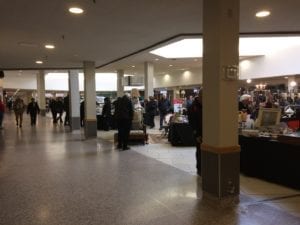CBC The Current podcast: We are natural storytelling machines, not statisticians – The Undoing Project (2017)

Cloverdale Mall, Feb. 20, 2016. In the background, where the orange rectangle is located, is the site of the former Target store at the mall. The red car on the left is now at a junkyard. Jaan Pill photo
A Jan. 27, 2017 CBC The Current article (with a link to a podcast) is entitled: “How two game-changing psychologists changed the way we think about thinking.”
Click here for a transcript of the Jan. 27, 2017 CBC interview >
The CBC interview on which the article is based, was with the author Michael Lewis.
I found the interview, with guest host Nora Young, of much interest, and made some notes as I was listening to it.
The interview is concerned with what is going on in the human mind, when it’s facing uncertainty.
An underlying message is that we are natural storytelling machines, not statisticians. The mind is easily swayed, in ways that it should not be. By way of example, anger can lead us astray.
What is going on in the human mind is of interest. Storytelling is concerned with how the mind works, as I’ve noted at a previous post.
I heard the Jan. 27, 2017 CBC The Current interview on the day it was originally aired. I listened to the first part on a car radio. I listened to the rest of it on an iPhone, while sitting at the food court at Cloverdale Mall.

Located a few kilometres apart, Cloverdale Mall (above) and Sherway Gardens are a study in contrasts. Each seeks to frame reality, and to bring sense to everyday life, in its own characteristic manner. Jaan Pill photo
I was totally unaware (until today) that Cloverdale Mall could be a target for pickpockets, until today when I came across a Jan. 26, 2017 Toronto Star article entitled: “Police search for two pickpockets targeting Etobicoke diners: Pair would push back their chairs and pretend to reach in their own pockets when they were really reaching into coats, purses hanging off the back of the victims’ chairs, police said.”
Two characters, Danny and Amos
Two characters, both of them psychologists, are highlighted in the CBC interview. The story, which drives the interview, is built around them. One character is named Danny; the other is named Amos. Their full names are Daniel Kahneman and Amos Tversky.
Danny, according to my notes from the interview, had a gift for discovering his own fallibility. Amos, who in contrast was very sure of himself, provided a reassuring place for Danny. The two characters demonstrated strongly divergent character traits. They differed strongly in their ways of thinking, and their ways of relating to the world.
Despite these differences, they worked together beautifully, for many years (until they finally had a parting of the ways), and changed our thinking about what human thought entails.
Danny and Amos finished each other’s thoughts. The two of them were like an improvisational comedy team. They grew up and worked in Israel. The judgements and misjudgements, that they were dealing with as psychologists, were matters of life and death, affecting the fate of Israel, in the course of military engagements.
The two of them invented judge-and-decision psychology. At least, I think it was “judge and decision” that I heard, when I was listening to the interview on my iPhone.
In the course of their work together, Kahneman and Tversky discovered that a person’s judgement can be warped by some irrelevant bit of information, that is introduced before the decision.
How do you dramatize such a discovery? That is, how do you convince people that such a process of warping of judgement occurs?
They set up an experiment with a Wheel of Fortune. After it was spun, the wheel would stop at a particular number, high or low. The experimenters would ask each subject, after the wheel had stopped, a question, namely: “How many countries in the UN come from Africa?” The answer, it turns out, depends on what number had turned up on the Wheel of Fortune. The interview noted that this is a principle, that every car salesperson knows.
In combat in the Middle East, the interview noted, you can easily get lost in the desert, and perish. The senses could be tricked. These were the kinds of issues, related to judgements and decisions, that preoccupied the two characters, in their work as a team of psychologists.
Among other things, the interview also addressed issues related to the near-meltdown of the global economy in 2008. Was the event a matter of ideology, or was it a matter of misjudgement, by a key decision-maker? Listen to the interview, if you wish to learn more about the points that were covered.
The Undoing Project (2017)
The book that the CBC interview discussed, in the context of the work of Danny and Amos, is a study by Michael Lewis entitled The Undoing Project: A Friendship that Changed Our Minds (2017). The first paragraph of a blurb for the book reads:
Forty years ago, Israeli psychologists Daniel Kahneman and Amos Tversky wrote a series of breathtakingly original studies undoing our assumptions about the decision-making process. Their papers showed the ways in which the human mind erred, systematically, when forced to make judgments in uncertain situations. Their work created the field of behavioral economics, revolutionized Big Data studies, advanced evidence-based medicine, led to a new approach to government regulation, and made much of Michael Lewis’s own work possible. Kahneman and Tversky are more responsible than anybody for the powerful trend to mistrust human intuition and defer to algorithms.
[End]
Thinking, Fast and Slow (2011)
A related study is entitled Thinking, Fast and Slow (2011) by Daniel Kahneman. The first paragraph of a blurb for the study reads:
The guru to the gurus at last shares his knowledge with the rest of us. Nobel laureate Daniel Kahneman’s seminal studies in behavioral psychology, behavioral economics, and happiness studies have influenced numerous other authors, including Steven Pinker and Malcolm Gladwell. In Thinking, Fast and Slow, Kahneman at last offers his own, first book for the general public. It is a lucid and enlightening summary of his life’s work. It will change the way you think about thinking.
[End]
The storyteller as statistician
An underlying message of the Jan. 27, 2017 CBC interviews is that we are natural storytelling machines, not statisticians. The mind is easily swayed, in ways that it should not be. By way of example, anger can lead us astray.
Additional thoughts occur to me, with regard to the message. First, mathematics is a language. Secondly, statistics is a form of storytelling. Like storytelling in general, statistics as storytelling operates for good or for ill. Its operational utility is part of its own story.
The power of stories
Also, of interest: A Jan. 27, 2017 Brookings Institution article is entitled: “What science tells us about how to combat fake news.”
An excerpt reads:
Using psychological science as a base, there might be a way around the problem. Post-hoc reviews of inaccurate information will rarely, if ever, be able to negate the damage fake information has already made. But there is a way to preemptively discredit those known for sharing inaccurate information and the stories they spin before their messages are broadcast to the public.
As a best practice, we should resist the temptation to publish statements and tweets before we fact check. Rather than focusing on the facts of each statement after they are delivered to the public, journalists can preserve the integrity of the news by delaying the presentation of questionable statements until they have the ability to credit or discredit them. This would allow news headlines to clearly label the accuracy of supposed news.
[End]
A March 29, 2017 Pew Research Center article is entitled: The Future of Free Speech, Trolls, Anonymity and Fake News Online: Many experts fear uncivil and manipulative behaviors on the internet will persist – and may get worse. This will lead to a splintering of social media into AI-patrolled and regulated ‘safe spaces’ separated from free-for-all zones. Some worry this will hurt the open exchange of ideas and compromise privacy.”




By way of an update to this post, a June 6, 1996 New York Times article is entitled: “Amos Tversky, Expert on Decision Making, Is Dead at 59.”
As well, a Feb. 16, 2014 Guardian article is entitled: “Daniel Kahneman changed the way we think about thinking. But what do other thinkers think of him?: Thinking, Fast and Slow was a global bestseller, and had a profound impact on psychology and economics, as these tributes from other leading figures show.”